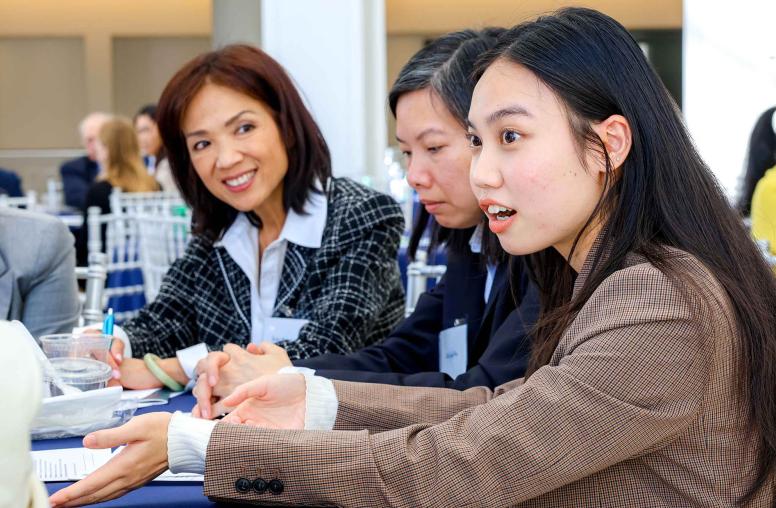When violent conflict erupts, young people are often among the most impacted. Indeed, globally, one in four youth are affected by conflict and violence. But their voices are frequently among the most marginalized in efforts to prevent or resolve conflict. Young men are regularly depicted as the perpetrators of violence and young women are portrayed as victims. This narrative severely discounts the important role young people play in building peace. Research shows that peace processes are more successful when they are inclusive and in many conflict-ridden societies youth account for a large percentage of the population, making their participation all the more vital. A new United Nations Security Council resolution passed in July aims to enshrine the critical role of youth in building peace.

From the impact of the COVID-19 pandemic to long-unresolved conflicts to climate change, young people often have the most at stake. “They [youth] are the ones who have to live with the consequences of our action or lack of our action,” said Francisco Cortorreal, the Dominican Republic’s representative at the U.N., during discussions on resolution 2535.
“Young people around the world are actively transforming conflict and building peace in their communities, many times putting themselves in danger while doing this work,” said Alison Milofsky, who oversees USIP’s youth portfolio. “However, their work often lacks recognition and support. The adoption of resolution 2535, like previous resolutions on youth, peace, and security, moves us further toward acknowledging and supporting the critical contributions made by young people.”
A Turning Point for Youth
United Nations Security Council Resolution (UNSCR) 2535 is the third resolution on youth, peace and security. Passed in 2015, resolution 2250 called for international recognition of the role that youth play in building peace at the local and national levels. Subsequently, 2018’s Resolution 2419 stressed the importance of protecting young people working for peace on the ground and, above all, ensuring their participation at the negotiating table. These are the building blocks upon which the new resolution was built. But this time the U.N. Security Council consulted with youth peacebuilders to provide input on the resolution, demonstrating a significant shift: from the recognition of youth’s important role in peacebuilding to including them as direct, active participants.
This represents a turning point for young people, whose voices are being heard at the highest levels of international diplomacy. Indeed, one of these authors (Ekomo-Soignet) and the organization she founded in the Central African Republic (CAR)—called URU—provided direct input on the resolution as part of the Global Coalition on Youth, Peace and Security (GCYPS). URU, which means “take off,” is a youth-led peacebuilding organization that champions the voices of young people in CAR and works to ensure their inclusion in peace processes. While its daily work focuses on promoting locally led approaches for youth to build peace, URU has brought the voice of CAR’s youth beyond its borders through its work on UNSCR 2535.
Prioritizing Youth Issues
GCYPS recommendations included in the resolution were the call for proactive inclusion of marginalized groups and regular reporting from the secretary-general on progress regarding implementation of the youth, peace, and security agenda. The reporting system enshrined in UNSCR 2535 ensures that youth issues are no longer seen as a cross-cutting issue within U.N. agencies and missions. The lack of a consistent focus on youth issues has often led to U.N. missions making young people a secondary priority or integrating them into other issues, such as countering violent extremism or the women, peace and security agenda. Young people have advocated for a more structured approach to youth engagement with U.N missions. As one example, a youth coordinator or focal point at each U.N. mission could ensure youth issues are properly prioritized in their own right. UNSCR 2535 also takes the significant step of stipulating that the Office of the Secretary General’s Envoy on Youth should be responsible for promoting coordination and coherence of youth, peace and security activities across the U.N. system, and for tracking implementation of the resolutions 2250, 2419 and 2535.
Russia and China have previously opposed the inclusion of youth issues at UNSC deliberations. Resolution 2535, however, was passed with unanimous support, demonstrating that the international community is reaching a consensus on the vital role of youth. For too long, youth have been marginalized in international peace efforts, often used as props for photo ops. But resolution 2535 demonstrates that the international community increasingly realizes that youth’s meaningful participation is a necessary component of building lasting peace.
“Resolution 2535 represents a seminal achievement for youth peacebuilders and practitioners, and a crucial endorsement of the fact, backed by a growing body of evidence from across the world, that youth are critical to building and sustaining peace,” said Tyler Beckelman, director of international partnerships at the Institute.
UNSCR 2535 opens a new era for young peacebuilders—but there is still more work to be done. Young peacebuilders need enhanced capacity to conduct research and report on best practices for youth inclusion in conflict mitigation efforts. With three resolutions now passed, there is a need to push for the effective implementation at the country and local-government levels.
“The potential for humanity to create a peaceful, prosperous future will not be reached as long as inequities and discrimination against youth remain commonplace, and young people lack opportunities to have their voices heard,” said Tijjani Muhammad-Bande, the president of the U.N. General Assembly. Resolution 2535 provides a framework to ensure youth voices are not just included in peace talks, but incorporated into the ways in which peace is built and sustained.
Rebecca Ebenezer-Abiola is a program officer for youth programs at the U.S. Institute of Peace. Kessy Martine Ekomo-Soignet is a USIP Generation Change fellow and founder of the youth peacebuilding organization URU.


